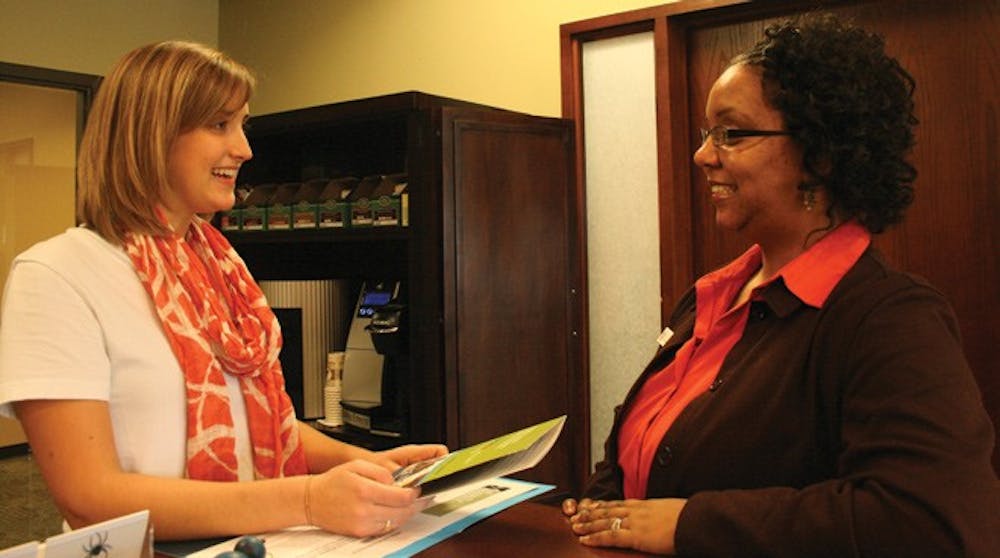Many University of Richmond students are opting for alternate jobs with programs such as Teach for America and the Peace Corps, with the economy possibly motivating their choices.
The Career Development Center hosted "Peace Corps Revealed" on Feb. 2 to remind students of alternate jobs that are available to them after graduation.
Sixty-three people, mostly Richmond students, attended the event. Those who wanted to find out more information had the chance to talk to a Peace Corps recruiter and several Richmond professors and administrators who had served in the Peace Corps.
Among the professors at the event were physics professor Henry Nebel, who taught at a national university in El Salvador from 1974 to 1976; Carl Sorensen, associate vice president for human resources, who taught math in Swaziland during the 1980s; and English professor Ray Hilliard, who taught in Nigeria and Tunisia.
Nikki Waterman, a history, French and Italian student, said she was interested in the Peace Corps because it offered an opportunity to teach as well as to travel.
"One of my life goals is to go to every continent," Waterman said.
Junior Ryann Murray also attended the CDC event.
"I'm interested because I don't know what I'd like to do after college," she said. "I'm a sociology major but I have no idea where that's going to take me."
The Peace Corps would give her 27 months to figure out what she was going to do next.
Mark Gormley, the Peace Corps recruiter for the Richmond area, said he could make a lot of money doing other things, but enjoyed his job.
"It's the most important work we can do," he said.
The university has produced Peace Corps volunteers every year. Gormley said Richmond students were well qualified because they had a liberal arts degree and had taken a foreign language.
Enjoy what you're reading?
Signup for our newsletter
"You guys have the programs we're looking for," he said, "but at the same time, there is a good sense of public service here."
Other universities may not have as good of a career center, or as many service-learning or study-abroad opportunities because they do not have the resources and funds that are needed, he said.
A lot of people who enter the Peace Corps right after college want to travel, he said.
"Everybody who applies wants to make a difference," Gormley said. "But at the same time, there are personal reasons. I think the job market is helping increase applications, but is not the only drive."
More schools are offering study abroad programs and opportunities such as alternate spring breaks, which might open people's minds to alternative jobs, he said.
The average amount of time between submitting an application for the Peace Corps and going abroad to serve is one year. Some applicants work through the paperwork and medical clearance quicker than others, and about one in four applicants are accepted and serve, Gormley said.
He encouraged interested juniors to apply by July 1 for a position upon graduation.
Each year, some Richmond students have opted to take positions with Teach For America, a non-profit organization that places recent college graduates as teachers in urban and rural and public schools.
Senior Meg McCall was accepted to the Teach For America program and found out in November that she would be teaching middle-school math in Charlotte, N.C.
"I actually applied on a whim," McCall said. "I never thought I'd go into teaching. It just kind of hit me that it was something I'd love to do."
The Teach For America application process begins with an online application, and students who make it past the initial round are then invited for phone and in-person interviews, said Amanda Mills, the Teach For America recruiter for the Richmond area.
The current economy might be a factor in a person's decision to apply for Teach For America, McCall said.
"The idea of having job security for the next two years is great," she said. "But it's not why I applied."
Richmond has produced an average of five to 10 Teach For America volunteers each year. For the university's size, it is one of the top volunteer contributors for Teach For America, said Joselyn Bedell, assistant director of the CDC.
Mills said that so far this year, 10 Richmond students had been accepted to the program and nine had confirmed. The final round of acceptance notifications will be on Feb. 12.
The economy might factor into the number of applications, but Mills said she hoped people applied for the right reasons. She said the program was definitely seeing more applicants as a byproduct of the economy, but that people were also becoming more aware of injustice in education.
"In working with Richmond students, I've been impressed by the level of commitment to social justice," Mills said.
The Peace Corps and Teach For America are two of the bigger alternate programs students look into, but many also look at such programs as AmeriCorps and the Fulbright Scholar Program - programs that are considered federal experiences and could possibly provide participants with a competitive edge for future federal employment.
"Richmond students are accepted at an increased rate based on all the experience they have," Leslie Stevenson, the director of the CDC, said. "Our students are more interested in non-traditional job paths."
There is no doubt that applications for alternative jobs have increased during recent years, Bedell said.
"It ebbs and flows as the economy is doing well or not," she said.
Contact staff writer Ashley Graham at ashley.graham@richmond.edu.
Support independent student media
You can make a tax-deductible donation by clicking the button below, which takes you to our secure PayPal account. The page is set up to receive contributions in whatever amount you designate. We look forward to using the money we raise to further our mission of providing honest and accurate information to students, faculty, staff, alumni and others in the general public.
Donate Now



